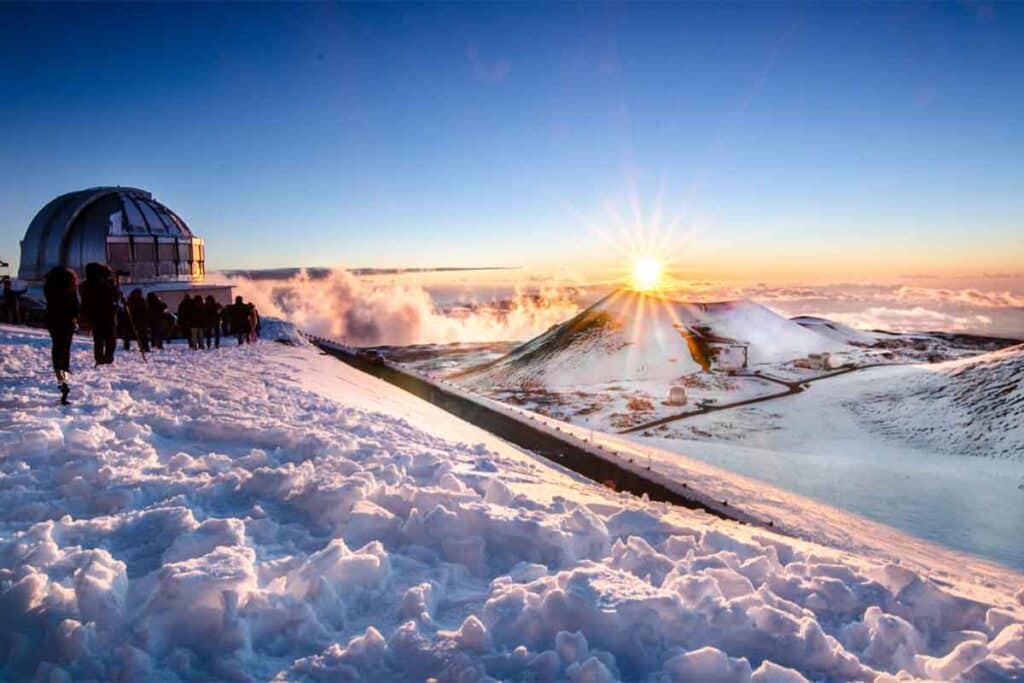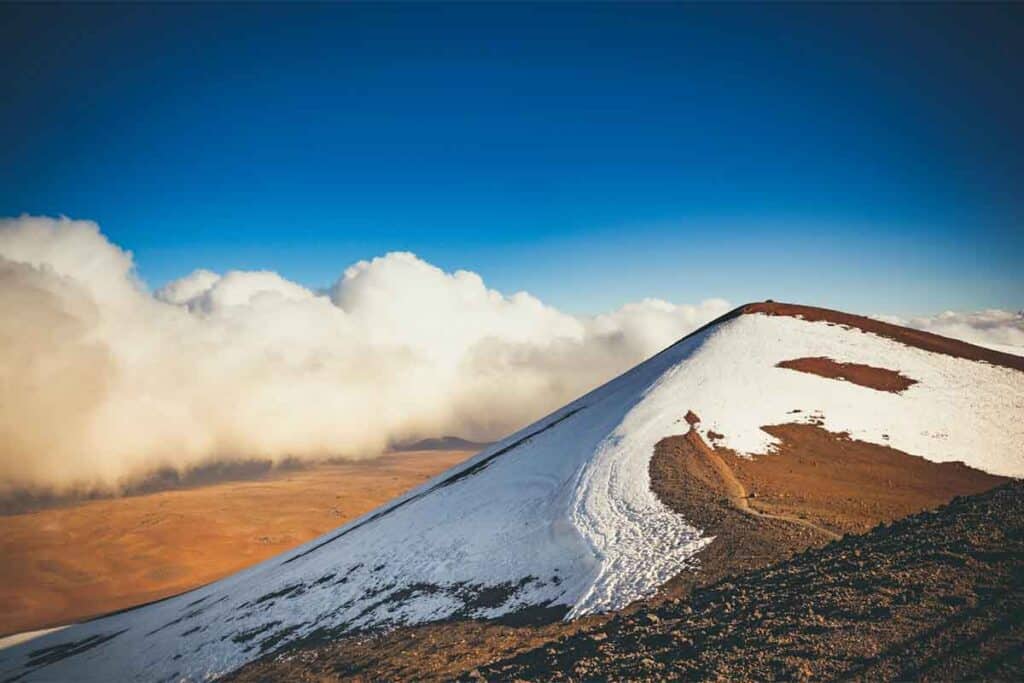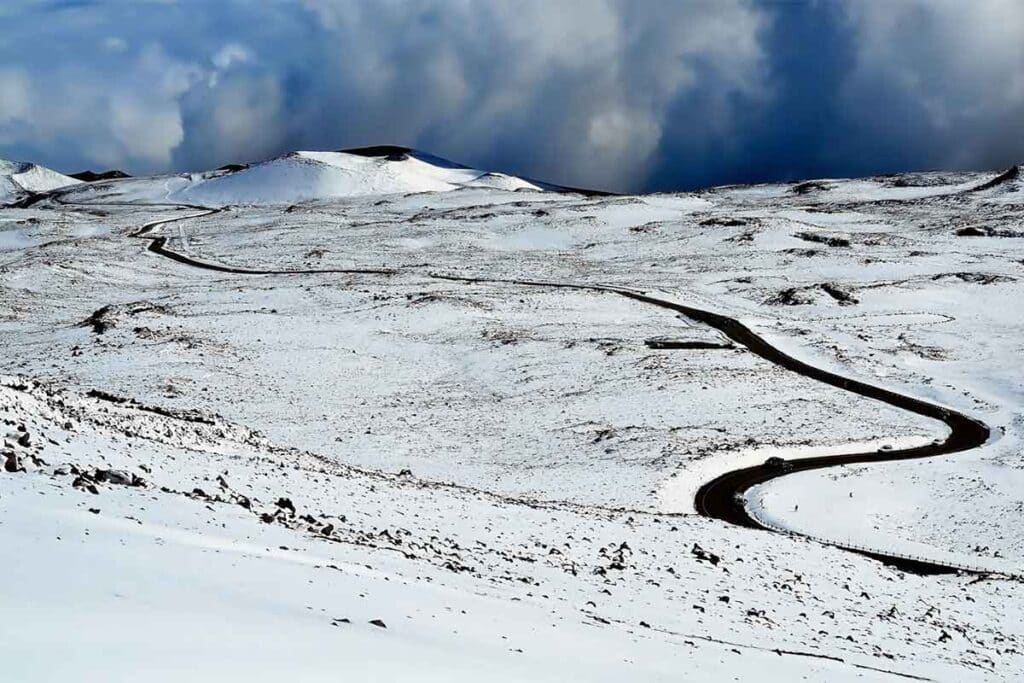Hawaii is a tropical paradise, and for many, a place to escape the chilly weather. If you’re thinking of living or retiring in Hawaii or taking an extended vacation, you must be wondering about the weather and if it ever snows. Does it snow in Hawaii?
Yes, it snows in Hawaii, but only in places elevated above 10,000 feet. They include Haleakala, Mauna Loa, and Mauna Kea, the three highest volcanic mountains in this sun-kissed state. Other areas, such as Hualalai, Pu’u Kukui, and Kaunu o Kaleihoohie, get cold but do not receive snow.
Apart from answering the question, ‘Does it snow in Hawaii?’ this article also covers questions like, ‘How often does it snow in Hawaii?’ If you’re thinking about a specific place, say Maui, and wondering, ‘Does it snow in Maui?’ read on to learn more about Hawaii’s historical and current weather, its snowy mountains, and places that experienced unprecedented snowfall and rainfall.

Why Does It Snow in Hawaii?
Hawaii experiences a ‘Kona Low,’ a Polynesian phrase that means ‘leeward storm.’ In other words, this means Hawaii’s wind direction changes drastically. While Kona Lows may happen even during summer seasons, a 2017 study by the International Pacific Research Center at the University of Hawaii suggested that snowfall on the volcanic mountains could gradually dissipate due to climate change.
If you’re thinking of moving to Hawaii, it’s probably best to pack not just your summer clothes but a winter jacket (view on Amazon), too. This 100% polyester thermal jacket has insulated quilted sleeves for comfort and warmth during the winter season.
How Often Does It Snow in Hawaii?
At least once a year. The mountain peaks of Haleakala, Mauna Loa, and Mauna Kea get the lion’s share of snow throughout the year, often dropping their temperatures below freezing when there’s a snowstorm. During Hawaii’s winter season that runs from December to February, snowfall is more frequent. The peak of Mauna Kea is known to occasionally receive snow dusting even during Hawaii’s dry season from May to October. Depending on the snowstorm’s strength, snow could linger anywhere between 3 and 6 days.
Does Hawaii Get Cold?
During the winter season, a significant drop in temperature (below 64°F) in the areas surrounding Hawaii’s snow mountains is hard to ignore. While the rest of Hawaii doesn’t get snow, nearby areas experience the cold downdraft.
While Hawaii is generally a tropical travel destination, you’d be surprised that within a few miles from one point, one place could feel extremely cold while another is tolerable. An example is Mount Waialeale, one of the world’s wettest spots, which experiences about 1,168 centimeters of rain every year. Move a few miles toward Na Pali-Kona Forest Reserve, and you’d get a drastic drop in rain index to only 25 centimeters.
Whether you plan to visit Hawaii or stay there long-term, you’d never know when you might need a reliable pair of winter boots (view on Amazon). This pair has faux shearling snow cuffs that go well with any wardrobe.
Hawaii’s Snow Mountains

Where does it snow in Hawaii? Three volcanic mountains in Hawaii receive snow. However, snow seldom reaches below 9,000-feet and usually dissipates within a few days after a snowstorm.
Haleakala
Found in Maui Island, Haleakala stands 10,000 feet tall and hasn’t erupted in the last 400 years. With a name that means ‘house of the sun,’ tourists flock to Haleakala to witness sunrises and sunsets. As the lowest of the three volcanic mountains in Hawaii, Haleakala receives less snow than Mauna Loa and Mauna Kea. It has, however, a trail toward the mountain top.
Mauna Loa
Mauna Loa is the largest of Hawaii’s snow mountains and that of the world. With its literal translation ‘Long Mountain,’ the active volcano’s dome measures 75 miles long and 64 miles wide. Above sea level, it stands nearly 13,600 feet. Making up almost half of Hawaii’s landmass, it was reported in early 2021 that it might be waking up after its last eruption in 1984. The main tourism center of Kailua-Kona is within striking distance of this active volcano, as well as the populated area of Captain Cook.
Mauna Kea
Of the snow mountains in Hawaii, Mauna Kea, the highest but dormant peak among the three (almost 13,800 feet), sometimes becomes blanketed by snow even in summer. Often called ‘White Mountain’ by locals, its nearly constant below freezing point temperature makes it a favorite among professional skiers. Its summit, however, is uninhabitable and dominant in alpine tundra and lava rock. In winter, the average temperature at Mauna Kea is somewhere between 25- and 40-degree Fahrenheit. During the summer season, it’s playing between 30 and 60.
The Mauna Kea Observatory is at 14,000 feet elevation and is above the cloud line. However, it’s said that clouds only form above it once a year.
Despite the snowcaps on these mountains, you could still generally enjoy staying in Hawaii. Ranking as the happiest and less-stressed state in the US, you’re always just a few steps away from a beach. Pack your bag, and make sure to bring sunblock, a beach blanket, and a beach tent (view on Amazon). A canopy sun shelter good for 6 to 8 people, lounge and breath in the fresh ocean breeze.
Can You Ski in Hawaii?
The slopes of Mauna Kea have been a ski destination but only for professionals, as it rightfully should be. Since Mauna Kea is a National Science Reserve, it isn’t maintained as a ski area, according to the Mauna Kea Ski Corporation. The Hawaii Ski Club also adds that there are no lifts but a road to go to the summit. If you’re climbing to see the famous observatories, a 4-wheel-drive vehicle is a must.
Hawaii’s Record-Breaking Snowfall
On April 6, 1938, Mount Haleakala experienced the first-biggest snow covering to as much as six inches.
In December 2016, residents near Mauna Kea experienced snowfall when the mountain’s tip was capped by over two feet of snow.
In January 2021, Hawaii’s three snow mountains had their second-biggest snow covering since the monitoring started in 2000.
Which Island in Hawaii Has Snow?

Only the three volcanic mountains in Hawaii get snow and the snowcaps quickly melt away days after a snowstorm. Snowstorms in the past years, however, transformed some summer destinations into not-very-summery scenes. So, where does it snow in Hawaii apart from the mountain peaks?
Polipoli State Park
Once a hiker’s heaven, this park in Maui Island, home to 10 acres of the Kula Forest Reserve, became Winter Wonderland in February 2019. And it only sits at 6,200-feet elevation!
Wailua Homesteads
Located at the eastern side of Kauai Island, they didn’t experience snow, but the gale winds precariously danced the dense trees.
Waikiki
Strong winds uprooted some trees.
Oahu
The National Weather Service of Honolulu recorded waves up to 60-feet high.
Hawaii Islands’ Record-Breaking Rainfalls
While snow isn’t a regular occurrence in Hawaii (except the mountain peaks), a few islands recently experienced rainfalls that surpassed historic records.
Hilo
In January 2021, Hilo registered a maximum daily rainfall of 5.3 inches, shying its former record of 4.4 inches in 1996.
Honolulu
Honolulu’s maximum rainfall was once at 2.0 inches in 1961. Also, in January 2021, the island slightly broke that record with 2.8 inches of rain.
Potential new records as of January 2021 are Glenwood with 7.82 inches within 24 hours, Kapapala Ranch with 7.33 inches, and Saddle Quarry with 6.99 inches.
Does it Snow in Maui?
Maui gets snow, but only every other five years or so, and it stays at the peak of Mount Haleakala. Although, when Polipoli Spring State Recreation Area became covered in snow during a winter storm, it was unprecedented.
Conclusion: Does It Snow in Hawaii?
It does snow in Hawaii. While snow is primarily on top of the Big Island’s three volcanic mountains, other areas experience small amounts. Hawaii remains among the places to be whether you’re booking a short trip or planning to move. From breathtaking landscapes of lush forests to waterfalls streaming down the island’s mountainsides, you’d create memories worth remembering.
